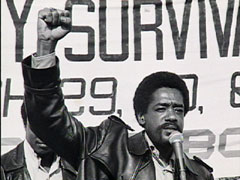 In January of 2013, I first encountered Bobby Seale on Facebook. I am not sure how I ever got on his radar (although it might have been the article "The Open Assassination of Fred Hampton," which was read by his brother Bill Hampton and their mother, which Bill was kind enough to share with me). However it happened, it came about that I was to meet and get a chance to speak with another one of my personal heroes. The incredible turn of events over the course of 2016, resulting in a Trump "election" to the Presidency and the explosive growth of the Alt-Right (neo-Nazi) faction has been too distressing for me to write about at length. Suffice it to say that I see this phenomenon as the last gasp of white supremacy that sees its time shrinking. We can only fight against this new fascism and educate those among us about our history and our possible future. While I, and some other researchers, see this as a natural outgrowth of a war that began, in some sense, on 11/22/1963, there were many other key events that have emerged in the last fifty-plus years. The beast of white supremacy, expressed in the secret government that hates humanity and truth above all things, must be slain. Back to the present subject: While I was rooting around in my email, I found an email from Bobby from 2013, and after a moment remembered what it was. When we first started talking, I had asked him to do an interview that would eventually be published in Dissenting Views II. He wanted to perhaps gauge my seriousness, or at least get some idea of what I would be asking him, so he asked me for a set of questions. He looked at the questions, responded back quickly, and within a week or so I was recording us on a lengthy and incredible conversation. Sometime after we had recorded the interview, he had sent me an email with his written responses to the questions I'd submitted! And I had forgotten all about that until today. So what follows below are Bobby Seale's written answers to the questions I first submitted to him when initially seeking an interview. The ground covered is similar, but with enough additional detail to warrant a read. Or so I think. 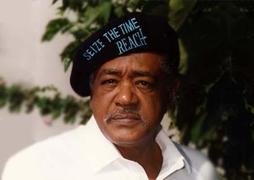 THE INTERVIEW In October of 1966, you and Huey Newton formed the Black Panther Party for Self-Defense. How did you come to meet Huey? On an introductory handshake I first met Huey in the early spring semester of 1962. It would not be until spring semester of 1963 we got to actually know each other, after he helped out my argument about the need for correct social science references to our African American people in one of my many anthropology classes. How critical was the assassination of Malcolm X in kick-starting the BPP? It caused me to make a move to try and start another organization. I put together four different programs and the Students Advisory Council. But it would be a year and a half later I insisted to Huey that we finish writing up our proposed ten point program for the Black Panther party at night in my office where I then worked for the Department of Human Resources for the Oakland City Gov at the North Oakland Neighborhood Center. The Panthers, in the public mind, tend to be associated with guns and violence. And yet the most radical thing the Panthers were doing was attempting to feed and educate young people. Can you talk about those programs? Yes, I created all of those first programs while Huey sat in jail a political prisoner. In my film we will show that my tangible community service programs and the "Free breakfast for children program" in particular was the real threat to J. Edgar Hoover and the Nixon administration. With our film project research committee we can literally document these facts in depth, beyond the public threats by J. Edgar calling our very programs a threat to the internal security of America. Very often the Party writings would draw a direct comparison with the overt colonization of, for example, the Vietnam War – and the covert colonization on the streets of Oakland, and Chicago, and Detroit and elsewhere. Has anything changed since the 1960s with regard to this colonization? By 1967 our BPP phrasing was, "The police occupy our community like a foreign troop occupy territory." That is, it was fascist containment of our ghetto communities, not 'protect and serve.' In 1966 months Before the BPP, my close organizing friend, Virtual Murell and I founded and created the Soul Student Advisory Council organization at Merritt College. Virtual and I with that newly registered organized on campus. We organized the first major Anti Vietnam-war rally at Merritt College. [Huey was not around, but in night private law school in San Francisco by this time. –ed note] It was an anti-draft rally telling black students to resist the draft because, one, we black people have served this country in every war since before the end of slavery, and to this day this racist USA does not recognize our constitutional democratic civil human rights. Twenty nine percent of all solders dying in Vietnam are Black Americans. Speaking of colonization, in many ways the War Against the Panthers – as Huey called it in his thesis – was a real war. Many people – who are not as well known to the public, like Little Bobby Hutton and Fred Hampton –were murdered in cold blood by the police. To this day, even to discuss these subjects remains controversial. What is your perspective on this? In my film we have documented, and we will depict all the FBI-police or coordinated attacks by the government and the shooting and fascist "murder" of Black Panther Party members. All backed up with solid evidence of how the FBI COINTELPRO operation literally planed the murder of Fred Hampton and Mark Clark December 4th, 1969. Bobby Hutton? The policewoman witness on the scene testified at the inquest "...they murdered Bobby Hutton." A quick hundreds of thousands of dollars settlement with the Hutton family. And that night in all the smoke from the tear gas and the fire that broke out, Eldridge Cleaver calling out to Little Bobby Hutton. "Bobby, take your clothes off Bobby." I believe to this day the police thought it was I, Bobby Seale, they were shooting. The FBI used COINTELPRO used espionage tactics in many cases– direct infiltrators, as in the Fred Hampton case, or using mail outs of fake “Panther” coloring books to discourage white support, or in the case of Stokeley Carmichael (Kwame Ture), using a faked informant report to create the impression he was working for the CIA. How aware were you at the time of the size of the operation against the Panthers? At the beginning of 1969, US Attorney General, John Mitchell, in the news, declared that by the end of the year we will be rid of the Black Panthers. I did not know the details of many things until various actions against us had happened. At the time I only speculated that it was of course the government planning the operations against my Black Panther Party... in my film I will show how I tactically moved to get Panther party members to fortify and ready themselves for defense from what I believed would be more future attacks. How, in the final analysis, we “won” the LA shoot out a few days after Fred Hampton was murdered in Chicago. I note that the Tea party rallied against me speaking three years ago at Seminole University in Orlando Florida, when they had declared then that they agree with everything that J. Edgar Hoover did to my Black Panther Party. Oh, by the way, there are two former BPP progressive people who are duly elected to the United States congress. 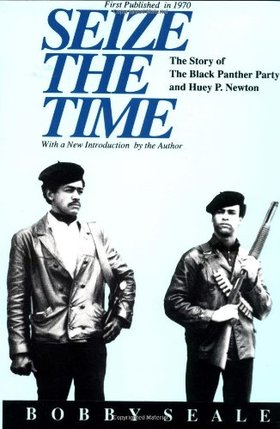 Martin Luther King, on April 4, 1967, gave a speech that signaled a sharp turn toward a more radicalized critique of the U.S. government foreign policy. A year later to the day, he was murdered. Was King an influence on you? What is your feeling about his legacy? MLK's legacy is very special to me. Moreso than Huey's or Eldridge Cleaver's. It was Martin Luther King in 1962 at the Oakland Auditorium who first inspired me. Later, in 1968, several weeks before Dr. King was murdered, Dr. Reverend Ralph Abernathy called me at my Central Headquarters office in Oakland, CA. explaining that Dr. King wanted me and my Black Panther Party organization to work with his upcoming poor people’s march, and further wanted to know if I would be willing to participate in a round table of more than a hundred organizations. One to identify all the common issues and problems we are all organizing around and working on. To meet and to work, over a period of time to come up with some practical economic goal objectives for people of color. Yes, Yes. Yes, I enthusiastically answered Dr. Abernathy. It was the BPP that organized people in the community and pulled off a rally at the Oakland Auditorium for Dr. King's Poor Peoples March. In addition to so many Black Panthers who were either murdered or imprisoned, many great leaders from the 1960s were also killed. All of these figures were on the Left. Is there any connection, in your mind, between what happened then and the country we have now? In the summer of 1969, I created a major one-week conference beginning at the Oakland auditorium with more than five thousand participants, 75% were all our white left radical friends and supporters from all across the USA. The conference was: "The United Front Against Fascism." Out of it we came up with the NCCF's: The "National Committees to Combat Fascism." At the conference I was in opposition to any ideas of state control command economy socialism, as I despised any and all advocacy ideas of Stalinist, politburo state control. I was about real bottom up organizing establishing "All Power to the all the people," neither the elites nor the corporate controlling rich. I introduced the ideological direction of greater Constitutional Democratic Community Control: from community control of police programs to greater community control of economic frameworks that retail and produce services and goods. First we democratically unite the small business in the communities and second how do we also start up businesses that are non-profit managed and actually owned by all the workers. What has happened today is the avaricious corporate control of these Republican-Tea Party economic extremists. What did you think of the Occupy movements? A very good and necessary Movement. Do you think real change is possible in our time? Yes.
0 Comments
AN ESSAY BY RICHARD BARTHOLOMEW 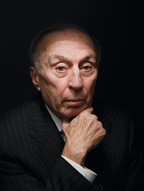 "The forces that killed Kennedy wanted the message clear: 'We are in control and no one — not the President, nor Congress, nor any elected official — no one can do anything about it.' It was a message to the people that their Government was powerless." - Vincent J. Salandria (1975) quoted by Gaeton Fonzi, The Last Investigation (1993) Vincent Salandria was right, and that message by the forces who killed Kennedy has become more clear, having been reinforced by the deep political events since Kennedy's death. Most presidents, members of Congress, and other elected and unelected officials have accepted that message and have done nothing to resist its tyranny. But not all.[1] Some of the resisters failed to get elected. Others failed to survive in office. They were killed, or blackmailed, or bribed, or conned, or scandalized, or frightened into stopping any further attempts to do damage to the Deep State. But not all. The next president must be a resister and a survivor who will oversee the full release of all of the files on the JFK assassination in 2017. But who among the 2016 candidates is that? It is not a matter of political advocacy, of being for or against a party or candidate in a corrupted election. We only defeat the Gordian Knot by refusing to untie it. It is a matter of explaining better the existing deep political reality using all of the evidence. In my view there is only one who meets the necessary criteria. This is my case for Hillary Rodham Clinton. To avoid anachronistic thinking, I try to consider what a resister would do today. For the sake of survival, such a person could not repeat the careers of John or Robert Kennedy. They resisted but did not survive. The challenge for a post-1968 candidate is to survive while resisting. The electorate is trained not to talk about the politics of assassination, but it is always the elephant in the room. Such a person would spend a lifetime becoming a viable candidate, and do whatever it takes to survive. The Kennedys, mostly Joseph P. Kennedy, knew the electoral realities in 1960. I think we have been repeating Kennedy vs. Nixon in major ways ever since. Power goes to the faction who can steal it, or foil the theft. The presidency is tough to infiltrate. But if our government's usurpers can do it repeatedly, so can its protectors and defenders. The big question is, can critical observers see the vague outlines of this battle of shadowed titans? I think so. It is necessary to distinguish the shopkeepers from the extortionists. Because there exist resisters like Libero Grassi, the shopkeeper from Palermo who wrote an open letter to an anonymous "Dear Extortionist." It rocked the boat, and Grassi was soon dead. But there are also "shopkeepers" who both resist and survive, like "Donnie Brasco" and "Bob Musella," who successfully infiltrated organized crime families and cartels. A modern-day Deep State resister/survivor would disingenuously act in the interest of the billion-dollar oligarchs, who finance political adventurism, in order to get into power, because it is the only way in a political system that clearly lacks legitimacy. The Clintons know not only the deep politics of assassination, they know something important that most candidates do not: how to get elected and survive in office while doing real damage to the Deep State. Their history shows two victories against the Deep State that stand above the rest. President Clinton's greatest legacy is the Assassination Records Collection Act, which apparently would have died in its infancy if not for his intervention. First Lady Clinton's greatest legacy is Travelgate, her much misunderstood attempt to protect her husband from Deep State assassins. There is a prehistory to those victories that can be seen by connecting the dots. During a 1992 campaign appearance with Bill Clinton in McKeesport, Pennsylvania, Clinton's running mate Albert Gore said he believed that President Kennedy was killed by a conspiracy of unknown origin and that all federal files should be opened to the public.[2] In his acceptance speech at the Democratic convention on July 16, 1992, Clinton paid tribute to the memory of his former Georgetown professor, Carroll Quigley. What a presidential candidate says in a speech at a national party convention is always symbolically significant, and never more so when the candidate is the party's nominee. Carroll Quigley of Georgetown University was a conspiracy historian and an insider of the organizations that created the world's Deep States.[3] 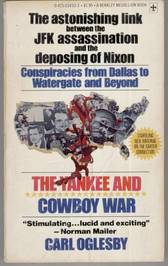 I think the key to understanding Hillary Clinton is not her feelings for Wall Street or Wal-mart, but for Carl Oglesby and Sidney Blumenthal, mutual associates of the Assassination Information Bureau. From the late 1960s until his death in 2011, Clinton had a warm acquaintance with Carl Oglesby, author of the 1975 classic of JFK assassination literature, The Yankee and Cowboy War. His political writings had a life-changing effect on her as a college student. Oglesby also founded the Assassination Information Bureau (AIB). They kept their friendship quiet for obvious political reasons.[4] Sidney Blumenthal, one of the Clintons' oldest, most trusted, and loyal friends and confidantes was also an acquaintance of Oglesby. With AIB founder Harvey Yazijian, Sidney Blumenthal co-edited Government by Gunplay: Assassination Conspiracy Theories from Dallas to Today, the classic 1976 anthology on the assassinations of JFK, RFK, MLK and Fred Hampton. Blumenthal's book, for which he wrote the forward and epilogue, and contributed two articles, includes an introduction by CIA whistleblower Philip Agee, Robert Groden's "A New Look at the Zapruder Film," and "includes the work of Peter Dale Scott, William Turner, Jeff Gerth, Carl Oglesby, Jerry Policoff...L. Fletcher Prouty and Allard Lowenstein, who himself was assassinated."[5] 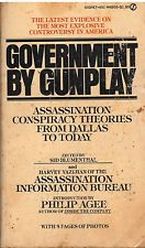 In the Clinton White House, Rahm Emanuel gave Blumenthal a special nickname because he kept pointing out hidden plots. As Carl Bernstein put it in his 2007 biography of Clinton, A Woman in Charge (p. 490), "Presidential aide Rahm Emanuel had given Blumenthal the nickname 'G.K.,' for Grassy Knoll, suggesting conspiracy theories on a scale with John Kennedy's assassination." In May 2015, after their email exchanges leaked regarding Syrian intrigues, Hillary Clinton had to publicly play them down, saying it was her desire to listen to diverse opinions. Oglesby, who stayed publicly linked to conspiracy, had to distance himself as Clinton's early political influence and acquaintance. Blumenthal, who is publicly known as her longtime close friend, has to distance himself from conspiracy analysis. As a result of these mutual acquaintances and friendships, Hillary knew exactly what she was talking about when she coined the term "Vast Right-wing Conspiracy" at the time of her husband's impeachment.[6] In the first four days of his first term, President Clinton, or an alert aide, may have saved the Assassination Records Collection Act, and the investigative body that it mandated, from expiring prematurely. I recall pessimistic discussions at that time by researchers of deep politics that the act has a clever self-destruct clause which states, "The President shall make nominations to the Review Board not later than 90 calendar days after the date of enactment of this Act." It was suspected that President Bush's signing the act into law on October 26, 1992 set an impossible deadline for nominations on January 24, a Sunday, only four days after Clinton was sworn into office. Establishing the Review Board was delayed for 15 months, and Congress did not fund its operations until October 1994. Until then, it was funded solely from the Clinton White House budget. These and other delays by federal agencies threatened the completion of the Board's work by the act's mandated three-year deadline, requiring a resolution from Congress granting another year which had to be signed into law by Clinton. Thanks largely to these necessary interventions from President Clinton, the act was saved, allowing the last major inquiry of the assassination to proceed. It succeeded in releasing nearly all of the remaining assassination documents, which further proved the conspiracy. It is easy to see how an apathetic or hostile White House could have prevented that success.[7] President Clinton had reason to be concerned for his personal safety when he said at a 30th anniversary press conference that he thought JFK was killed by a single assassin and he (Clinton) was satisfied with his own security arrangements.[8] The all-but-forgotten intrigues which occurred between the time of Travelgate and the death of Vince Foster are vastly important considerations in the deep politics of Clinton's public statements. On May 19, 1993, one of Clinton's presidential helicopters crashed in the morning, followed that afternoon by Vince Foster's involvement in the firing of the White House Travel Office staff of Bush holdovers (aka Travelgate). Scott Reynolds, William Barkley, Brian Hassley and Tim Sabel, who died in the crash, reportedly had served as Clinton bodyguards. The crash site, near Quantico Virginia, was reportedly closed to the press and a video of the crash site, taken by a fire fighter, was seized by military officials.[9][10] I personally recall that the crash was the top story that morning on CNN, but it strangely disappeared after the travel office firings dominated the news, despite the glaring fact that the job of the White House Travel Office was to book flights on presidential aircraft. The connection between those two events remains a deafening silence. The night of Vince Foster's "suicide," two months after the firings, it was the eve of his trip to Denver on Clinton's behalf to meet with an attorney about Travelgate. Foster's widow told Esquire magazine that Travelgate had been her husband's preoccupation since it happened.[11] In his eulogy, President Clinton called Foster "a great protector" of his friends, adding, "We could never remember a time when he ever asked us to protect him — it was always the other way around." [12] Carl Bernstein wrote in A Woman in Charge that "The president was concerned about how Foster would react to the [July 19 Wall Street Journal] editorial [linking Foster and Hillary to the Travel Office firings], and called to invite him to a White House movie screening of In the Line of Fire (strangely, about a would-be presidential assassin and a heroic Secret Service agent) that night. Foster declined...." (p. 340) In her first meeting with Webb Hubble, one of her closest friends, after Foster's death, and after their consoling words to each other, "Hillary then changed the subject to ask for some help regarding a rumor she had heard that before his death Foster had been investigating a group of assassins who worked for the Navy and made their victims look as though they'd committed suicide. She said that the president had already been approached by a reporter about it." (p. 343) "After Vince's death, she 'found more to judge as evil,' [old friend Dick] Atkinson could see. 'There seemed to be something basic that was reinforcing her view of good and evil, an element of embitterment there, and the notion of conspiracy." (p. 346)  At her own campaign appearance at the University of Tennessee in Nashville on January 29, 2008, candidate Hillary Clinton said, when asked, that she would do everything she could as president to release the remaining classified JFK assassination files.[13] The forces who killed President Kennedy continue to send a clear message that we are powerless to stop them. But we have never been completely powerless. We have long had enough proof of the conspiracy and conspirators. What we do not yet have is the power to force the usurpers of our government to give us the final details of their conspiracy. Criminal science teaches that the best way to combat a conspiracy is to infiltrate it successfully. When viewed from that perspective, the Clintons appear to be doing that, and doing it well. If the Clintons retake the White House and continue to survive, the final test of this perspective will be the final deadline in the Assassination Records Collection Act: October 26, 2017. It is the day all remaining withheld records on the Kennedy assassination will be released unless the president, and only the president, decides otherwise. It is also Hillary Rodham Clinton's 70th birthday. Copyright © 2015-2016 Richard Bartholomew, All Rights Reserved Notes:
1. Rex Bradford, "Whispers from the Silent Generation," Speech delivered at November in Dallas Conference, May 2013 http://www.maryferrell.org/pages/Essay_-_Whispers_from_the_Silent_Generation.html 2. Los Angeles Times, July 20, 1992. 3. Daniel Brandt, "Clinton, Quigley, and Conspiracy: What's going on here?," NameBase NewsLine, No. 1, April-June 1993 http://www.namebase.org/news01.html 4. James V. Grimaldi, "Clinton Quiet About Own Radical Ties," Washington Post, May 19, 2008 http://www.washingtonpost.com/wp-dyn/content/article/2008/05/18/AR2008051802101.html 5. Bill Kelly, "Max the Hack is Back" JFKcountercoup, June 15, 2015. http://jfkcountercoup.blogspot.com/2015/06/max-hack-is-back.html 6. Carl M. Cannon, "'Far-right conspiracy' a gift from Blumenthal Clinton adviser valued for his journalism past," Baltimore Sun, February 15, 1998. http://articles.baltimoresun.com/1998-02-15/news/1998046033_1_aide-sidney-blumenthal-white-house-al-gore Max Holland, "'Grassy Knoll' Sid: Hillary's Personal Conspiracy Theorist," Washington Decoded, June 11, 2015. http://www.washingtondecoded.com/site/2015/06/blumenthal.html#fn3 7. President John F. Kennedy Assassination Records Collection Act, 44 U.S.C. ch. 21 § 2107, Sec. 7(b)(2) http://www.gpo.gov/fdsys/pkg/STATUTE-106/pdf/STATUTE-106-Pg3443.pdf;https://en.wikipedia.org/wiki/President_John_F._Kennedy_Assassination_Records_Collection_Act_of_1992; http://spartacus-educational.com/JFKassboard.htm Final Report of the Assassinations Records Review Board, September, 1998. ch. 2, Sec. B. http://www.fas.org/sgp/advisory/arrb98/part04.htm 8. David E. Rosenbaum, "30-Year Commemoration In Dallas and Arlington," New York Times Nov. 23, 1993, p. A16. http://www.nytimes.com/1993/11/23/us/30-year-commemoration-in-dallas-and-arlington.html 9. Unsolved Mysteries Wiki, "US Marine Corps Helicopter Crash" http://unsolvedmysteries.wikia.com/wiki/US_Marine_Corps_Helicopter_Crash 10. Wikipedia, "White House travel office controversy," http://en.wikipedia.org/wiki/White_House_travel_office_controversy 11. Gregory Jaynes, "The Death of Hope," Esquire, November 1993, Vol. 120 Issue 5, p. 85.http://archive.esquire.com/issue/19931101 http://connection.ebscohost.com/c/articles/9402150567/death-hope 12. Paul Richter, "Clinton Eulogy Recalls Friendship With Foster," Los Angeles Times, July 24, 1993. http://articles.latimes.com/1993-07-24/news/mn-16379_1_white-house-aides 13. "Hillary Clinton Called for Release of JFK Files," JFK Facts, October 28, 2015. http://jfkfacts.org/hillary-clinton-called-for-release-of-jfk-files/ 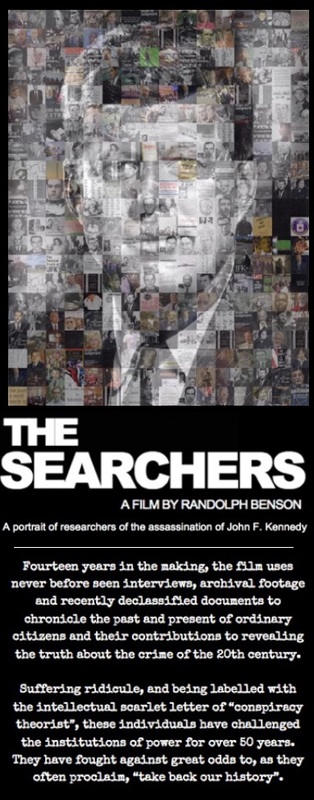 Randolph Benson’s documentary film The Searchers will premiere at the Texas Theater in Dallas on November 21, 2016. The film explores the unique subculture of JFK researchers from the standpoint of an outsider who found himself, over time, becoming an insider. It will also be making its debut on DVD. Benson’s work has appeared on the Bravo Network and Canal Plus – France, and his film Man and Dog received several awards, including a Gold Medal from the Academy of Motion Picture Arts and Sciences’ Student Academy Awards. He currently teaches at the Center for Documentary Studies in Duke University. I talked to him about the process of making his new film. So who are the searchers of the title? Who are they? The searchers are average citizens – normal people, curious people – who realized there was more to the [JFK assassination] story and information not covered by the media. The media wasn’t doing their job so they took it upon themselves to ask the unasked questions. Most of the first generation critics [those who started right after the assassination] started and never let it go. In a nutshell, they were normal people who have become marginalized – a lot of which was intentional by the CIA. They created the term “conspiracy theorist.” That term instantly became an intellectual scarlet letter. And your film focuses on these first generation critics? Not necessarily. The narrative thread is John Judge, who was generation 1.5. But I do cover the history of the subculture of the research community. The first generation was critical to tell the story and explain why anyone would commit any amount of their lives to this subject. There is that question – and it is a question for anyone doing anything – is why bother? They could have done anything. It was because they had questions that weren’t being answered. Because people from both generations helped reveal everything from the crimes of Vietnam and the crimes of Watergate, which led to the Church Commission, which revealed how our media was being controlled by intelligence agencies and had institutional protection. The broader world of how things work, rather than a limited conspiracy in this one case. I don’t necessary feel that conspiracy is a holistic term. What we’re really talking about is an institutional analysis. The really good researchers felt the same way, John Judge especially. Institutions, as I have learned, do not exist without natural protections. The intelligence community and the media are the same. 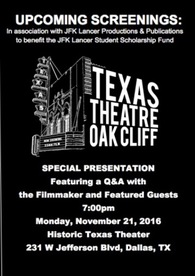 How long have you been working on this film? How did it start? I’m going to answer this…in a kind of long way, so bear with me. From the time I was a child it was just assumed in my house that the assassination was done by elements in this country. I felt bad because my father was a fighter in the Cold War stationed on the East-West German border. Anything happens within 15 minutes, he was in the air. Bay of Pigs, the attempts on [Charles] De Gaulle, any major movement of any Iron Curtain country, he was in the air. He found out Kennedy was assassinated at dinner in the officers club. He wasn’t scrambled. For my father - he was in World War II, Korea – when protocol at that level is not followed there is a meaning to it. [My father] was the patriot of patriots. “Yeah, they killed that bastard,” was his attitude. So when Oliver Stone’s JFK came out it piqued my interest again. I thought it was a really good drama and it had information – I mean, I didn’t know there had been a trial. Now the films I like to make – the stories that draw me in – are about people who have been marginalized. People who do things that have to be done but no one pays attention to. My personal question was who is uncovering this information? So in 2001, it reached a point that this is a film I want to make. Why are they doing what they’re doing and why isn’t the media doing it? It seems like it should be their job. I looked online and the only online presence at that time was JFK Lancer. So that November, I flew down to Dallas, no camera, just to see what was up. I learned there were two communities – there were researchers who were scholars…and there were those who lived up to the conventional wisdom – the classic “conspiracy theorist.” The scholars were doing good important work and revealing documents not just about Kennedy, but a whole part of American history that I had no idea existed. Someone at Lancer told me about COPA [the Coalition on Political Assassinations] and by the summer of 2002 I realized what I had to do. So I drove to Washington, D.C. to meet John Judge and film him at American University, where he honored JFK’s famous speech there. I shot the first frame of film on June 10, 2002. I thought at that time it would be a well-researched, short thirty-minute film. I would spend a couple years on it. But after spending a year looking at the footage and reading everything I could get my hands on pro and con, I just realized that I had no idea what I was taking about. If I were going to make a film like this, I would have to learn and meet as many researchers as I could. Spend the time. Documentary filmmaking is always about story, character, and access. Early on I realized this would not be a two-year project. Now, fourteen years later I feel like the film is done. The story that I am telling is told as well as it can be told. Who is the audience for this story? I’m asked all the time who my audience is. I have a card above my edit station that reminds me every day, who is my audience? And the answer is me, before I started this project. I was intellectually curious, considered myself well-informed, but had no idea about how so much about my country - and the world - truly works and how our institutions work. That person represents a huge part of our population that can affect change. I came from a middle-class family and never wanted for anything. Always knew I would go to college. But no one I went to college with would have believed everything I’ve learned. Hopefully people seeing the film will help them reconsider and start a dialogue. 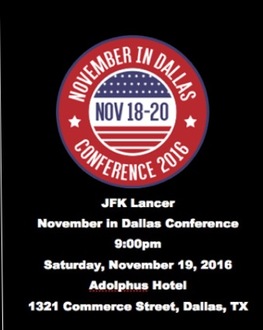 For many years now you’ve been going to conferences and interacting with researchers. Have you found them to be nutballs? Over the years, I met maybe three or four people who fit that description. The rest are doctors and lawyers and academics, the majority of whom are just normal successful people who were curious. The really respected researchers are as far from that stereotype as you can possibly be. Dr. Gary Aguilar is one of the most respected surgical ophthalmologists in the country. I have this great sequence in the film, all in one continuous shot, which starts with him seeing someone in his office and he asks if we can walk and talk into the elevator. We go down and walk out into San Francisco General Hospital and there is a young professional woman eagerly waiting on Dr. Aguilar. She shakes his hand and he walks into a conference room with a bunch of doctors who stand up and the applause is deafening. He proceeds to give a presentation on a new surgical technique for surgery that he had perfected. That one shot sums it all up for me. You almost have to be that good to retain your respect if you’re going to write about this sort of thing. Dr. Cyril Wecht is another example, someone who is the absolute top of his field in forensic pathology – the building is named after him at Duquesne University, and Albert Brooks just played him in the new Will Smith movie. He is the professional expert on CNN when things happen, the OJ trial, JonBenet Ramsey, etc., and yet he’s had this double life as probably the most visible figure on the medical aspects of the JFK case. If he wasn’t the pinnacle in his field, he would be easier to discredit. Instead, from what I can see the media basically pretend that part of his biography doesn’t exist. He has been able to pursue the science of the conspiracy to kill JFK and still remain the most respected doctor in his field in the world. If anyone needs an analysis with anything to do with forensic pathology, he’s the guy. Not just the media – other experts bring him in for a second set of eyes. He is involved in almost every single prominent case in the world. Every profession, every walk of life, there’s a certain amount of hyperbole – he’s the best of all time, the greatest, etc. I was skeptical when I first saw him referred to America’s most respected at pathologist. But I found out, it’s true. So did the CIA kill Kennedy? Sometimes I find myself looking at old interviews I did with John Judge…he broke down the intelligence agencies in such an interesting way. People think, it’s the CIA and I guess there are other things, NSA and maybe military intelligence. But John in detail would describe all 13 major intelligence organizations working in the United States and the CIA is the smallest. The military intelligence of the Coast Guard is bigger and has more money than the CIA. The black budget is enormous. So when people say the CIA killed Kennedy, I find it interesting that it stops there. What people tend not to know is that’s just one of 13 intelligence agencies – that we know of – and sure if you want to say they killed him, that’s fine, but put it as one-thirteenth. Its so limiting to say the CIA killed him. The assassination is the ultimate onion where you have the real story on the inside. The HSCA [the House Select Committee on Assassinations, the last official investigation of the assassination] said that there was a conspiracy, but also that other people might have been involved, but we can’t guarantee they were working together. Which is the most ridiculous conclusion possible. As John said, it was Shoot Kennedy Day in the knoll. The onion just keeps getting peeled back and the CIA-did-it is just another level of the onion peeling, which all goes back to the Joint Chiefs. I think John’s analysis is dead on. It’s so astute because in the end he understood human nature on a visceral level. What makes people human. I don’t think he would have been as good a researcher if he hadn’t been a peace activist. He was a conscientious objector in Vietnam who, in one of his defining acts, helped Vietnam veterans return home. He was in the middle of the winter soldier movement to get them the help they deserved and get them back into civilian life. All his research was approached in human terms. In the film, he appears passionate, divisive, brilliant, and antagonistic at times, but in the end he sums it up by saying by working together, we can change the world. That’s the final message of my movie and it’s Johns final message. Together we can change the world. In addition to the showings at the Lancer Conference and the Texas Theatre this November, The Searchers will also be available on DVD. Yes, starting with a boxed set which includes the film, as well as almost 34 hours of never before seen interviews with Mark Lane, Dr. Gary Aguilar, Josiah Thompson, Dr. Cyril Wecht, Jim DiEugenio, Lisa Pease, Walt Brown, Jim Marrs, Rex Bradford, James Fetzer, Debra Conway, and Adele Edison. You will be able to buy it at the website as boxed set and then I will start making the festival rounds. Starting at European film festivals and markets. There will also be a stand alone DVD for those who just want the film itself. TRAILER FOR THE SEARCHERS
(Written for the voice of Andy Rooney. Not that he would agree with the content.) 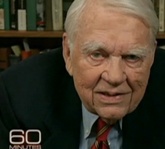 Have you ever thought that the internet was just too darn free? Do you ever find yourself longing for the days when only three networks told you what you to think all the time? Farhad Manjoo does, too. He wrote about it in an article for the New York Times called "How the Internet is Loosening Our Grip on Truth." He writes for the Technology section of the New York Times, so he must be a pretty sharp guy. But for a pretty sharp guy, he says a lot of strange things. This, for example: "Documentary proof seems to have lost its power. If the Kennedy conspiracies were rooted in an absence of documentary evidence, the 9/11 theories benefited from a surfeit of it. So many pictures from 9/11 flooded the internet, often without much context about what was being shown, that conspiracy theorists could pick and choose among them to show off exactly the narrative they preferred." He says that people believe in a conspiracy to kill President Kennedy due to a lack of documentary evidence. He doesn’t really explain what he means, but he seems to think that video evidence is what drives Kennedy researchers. So that, for example, Salon Magazine editor David Talbot wrote his 600-page biography of Allen Dulles, The Grand Chessboard, after seeing that one Zapruder film where the President’s head goes flying violently backward. Not violently forward, as Dan Rather said. 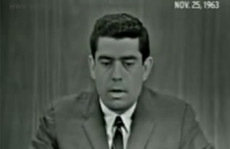 Hey, Dan Rather. He used to be one of the big opinion-makers in the good old days. Like Henry Luce of TIME Magazine and Bill Paley of CBS. Hey, my show was on CBS. Henry Luce and Bill Paley must have been some good guys. Except apparently they took orders from the CIA. And so did a lot of other reporters. You know, I don’t think I ever got a check from the CIA. Sometimes I would get free meals at the CBS Commissary, but only when Roberta was working there. I’m pretty sure she didn’t work in intelligence. She did, however, make great mashed potatoes. On the other hand, according to Manjoo, many people believe that 9/11 was a conspiracy because there’s too much documentary evidence. Too many videos! If only we had a way to choke all those off and make sure people only paid attention to the important videos. Which are the important videos? Well I guess they’d tell us. I wonder which videos Farhad Manjoo thinks are important. I would ask him, but he also says that “We all tend to filter documentary evidence through our own biases.” If that’s true, then he must have some biases that filter his evidence. So I wonder how he distinguishes the evidence he sees with his filter from the evidence that other people see with their filters, and how he decides which evidence is better. It’s all very confusing. I guess I won’t ask him after all. Farhad Manjoo sees terrible things in our future. He thinks that all this freedom of opinion is going to be a “boulder…to squash us all.” I guess that’s possible. Hey, do you think that boulder is built by American workers? I mean, apparently it’s Americans who are doing all this rogue thinking. I’d hate to think the boulder that squashes us all was built by foreigners. |
AuthorThis is Joe Green's blog. Archives
August 2021
Categories |
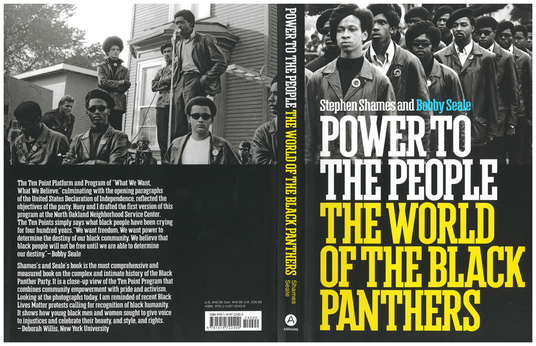
 RSS Feed
RSS Feed
